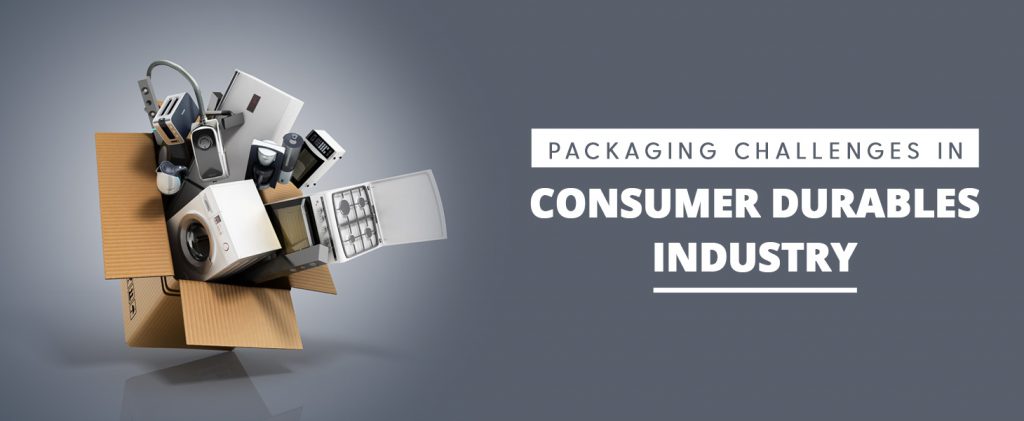Blog
Conquering The Client Durables Packaging Demanding situations
Conquering The Consumer Durables Packaging Challenges
[wpcc-script type=”text/javascript”]
Consumer durables are products that consumers use for a long time, typically, for years. Products that fall into this category include electrical appliances like refrigerators, washing machines, microwaves, air conditioners, furniture, tools, firearms and more. Therefore, the packaging of such goods become extremely important as they should reach the consumer in perfect condition. Often such goods are heavy and possess the danger of mishandling during shipping. These are also sensitive to vibration and shock. This makes the packaging quite challenging. Here are some of the major consumer durables packaging challenges.

Providing Adequate Protection
The objective of any packaging is to provide protection to the inner contents. In the case of consumer durable goods, the external packaging is seldom used to marketing and promotional purposes. The boxes generally look bland, with monochromatic prints. However, manufacturers design them to provide comprehensive protection to the goods inside.
Protection from Shock and Vibration
One of the most common issues faced by consumer durable packaging is shocks and vibrations during shipping and warehousing. This is because most consumer durable goods, such as electrical appliances, furniture, sports equipment are often quite heavy. This makes handing these goods quite difficult. To alleviate the problem manufacturers, make use of thick corrugated boards. In most cases, double or triple walled boards provide reasonable protection from dents and scratches. Most packaging also includes Styrofoam inserts as well as bubble wrap packaging.

To better handle packages, manufacturers provide cutouts in the packaging as handles. Bike manufacturer VanMoof went a step further to prevent damage to their bicycle frames due to mishandling during shipping. Their boxes come with an image of a television and not a bicycle. Since shippers know televisions are fragile, they ensure safe handling of the boxes.

Protection from Moisture
Manufacturers make use of cling film or BOPP tapes to wrap the packaging for protection from moisture. Smaller and lighter goods, such as camera lenses, come wrapped in airtight plastic bags that are then put into corrugated boxes. These boxes also have an external plastic lamination that allows it to resist moisture. These packaging also contain desiccating agents like silica gel to absorb excess moisture.

Protection from Static Electricity
Static electricity can damage electrical appliances. In these cases, anti-static packaging can be helpful. It is commonly used for microwaves, refrigerators, and computer components. The product is first packed in an anti-static bag before retail packaging. An anti-static bag is a simple plastic bag with a metalized silver film.
Protection from Corrosion
Manufacturers use anti corrosion bags to protect goods or its parts that can get damaged from corrosion. Often nuts, bolts, tools, and other metallic parts come in such plastic bags that inhibit rusting and other corrosive action. For instance, a television can come packed in an anti-static bag, but the wall mounts and the screws will come packed in anticorrosion bags.

Packaging That Can Sustain the Weight
Most packaging uses corrugated cardboard. So it is important to ensure their weight bearing capacity. Often packaging outlines clear instructions on how they should be clamped or if one should carry them using a trolley. This is to ensure that the goods do not fall down while holding the packaging. Shippers use packaging straps to ensure that the products do not fall through the packaging because of their weight.
Bundling
Consumers durables have very traditional package designs. This allows them to bundle quite easily. Because of their weight, stacking of packages is often not possible. However, some products like consumer electronics, lightweight appliances, self-assembly furniture, etc. are stackable. For efficient warehouse-space utilization, most consumer durable goods are packed in simple rectangular boxes irrespective of their shape. Here, proper use of void fills ensure that stacking and bundling of products without any damage.

Labeling and Serialization
Labeling and serialization can be a challenge in the case of consumer durables. Because often pack a single product part by part in different boxes. For example, split air conditioners are often shipped in two boxes, one containing the indoor unit while the other having outdoor unit. Most manufacturers print the product details on a separate label and affix them to the box during the packaging process.

Creating Sustainable Packaging
Packaging of consumer durables can be a costly affair. They use large amounts of packaging materials. In most cases, the consumers simple throws away the packaging. Therefore, it is important to ensure proper recycling or at least degrades without causing harm to the environment. Manufacturers now simply print using black soy ink on brown corrugated boards and prevent the plastic lamination whenever possible. This ensures that the boxes are recyclable. The inner plastic packaging is often made from recycled plastics or biodegradable PLA bags. Starch-based void fills and custom paper molds are now replacing styrofoam and bubble wraps.

Wrap Up
Packaging consumer durables for storage, shipping and transport can be quite a challenging task. Since most consumer durables are heavy and often come in multiple parts, making a well-organized durable packaging is a key problem. Depending on the product, different manufacturers use different methods to keep the products safe from the elements as well as mishandling during shipping. Recently, manufacturers are also exploring new options to provide more eco-friendly solutions.
[wpcc-script type=”text/javascript”]

